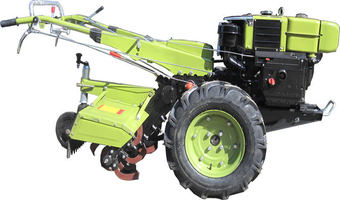 The introduction of mini tractors and power tillers that are 50 percent cheaper than conventional tillers is birthing a new farming revolution, which is now seeing more smallholder farmers enter mechanized agriculture, traditionally a preserve of their large scale counterparts.
The introduction of mini tractors and power tillers that are 50 percent cheaper than conventional tillers is birthing a new farming revolution, which is now seeing more smallholder farmers enter mechanized agriculture, traditionally a preserve of their large scale counterparts.
Depending on the user speed, on average, a mini tractor is able to plough about 1 acre in 2 hours.
The new farm equipment is expected to help foster food security and help more farmers adopt modern farming techniques with an aim of venturing into commercial farming. “For a long time mechanized agriculture which is globally known for increased food production has been left for a few ‘rich’ commercial farmers. Majority of these farmers are foreigners and are mostly engaged in flower and other non food agro products. It is behind this fact that we felt it ideal to sensitize and finally introduce these low cost equipment and tools to our farmers,” explained Vincent Odhiambo from Nyabond Enterprise the farm which has partnered with VST Tillers and tractors, the manufacturer from India.
Odhiambo and his team have been involved in widespread sensitization campaigns about the mini tractors and tillers among farmers. We started our sensitization campaigns in February 2014. We mainly used posters and videos and target farmer groups and cooperatives.”
Satisfied that their target clients were now ready to acquire the machineries, the team has now started traversing the country with demonstration tractors and equipment. “In May this year, we started the demonstration of how the equipment works to the farmers and have really received several orders ranging from cooperatives to individual farmers,” noted Odhiambo.
According to Odhiambo, the power tiller has received more excitement among the farmers largely due to its affordability and low maintenance costs. The power which is literally described as a walking tractor due to the fact that the user pushes it, costs about Sh300, 000 with a diesel consumption capacity of about 1.2litres per hour. “If a machine meant for a similar job is five times cheaper than the conventional ones in the market then of course it’s just logical that most users will go for the cheaper product. The tiller is even better positioned than the other tractors in the market when it comes to the low fuel consumption putting in mind that other tractors consume about 4litres of diesel per hour.”
Odhiambo explained that the tiller is a multipurpose tool which can also be used for irrigation, spraying, pulling a trailer and even electricity generation. The tillers are also said to be suitable for rice farmers because of their other ability to plough in wet surfaces. For the rice farmers, what one does is exchanging the normal tires with special metallic ones which then suit the rice paddies.
The small portable nature of the mini tractor and tillers also according to Odhiambo is an aspect that positions it above other tractors. The tillers can be used for intercropping, weeding and even access some terrains that are not accessible by the large tractors. Currently the firm has sold over 100 mini tractors a trend Odhiambo noted is commendable given that they started selling them two weeks ago.
Although viewed as a new a technology in Kenya, the mini tractors and power tillers the power tiller technology was invented in the early twentieth century to replace manual ploughing. With statistics indicating that smallholder farmers contribute to over 80 percent of food production, according to Odhiambo, the introduction of such affordable technology will even spur food production and enhance agribusiness growth in the country.
















Comments powered by CComment